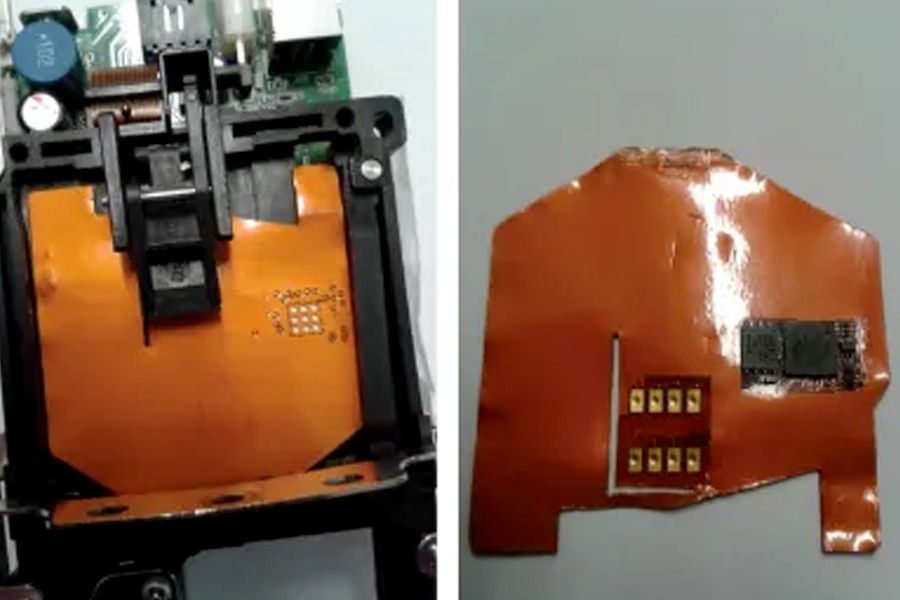
These devices are stealing credit card information in Baltimore
Inserting your credit card into a gas station pump shouldn’t be a risk, but authorities in the Baltimore region say they have new evidence it’s a pervasive problem.
The U.S. Secret Service announced Friday that, in collaboration with local law enforcement, authorities examined over 3,000 card readers, gas station pumps and ATMs looking for illegal skimming devices.
They found and removed 22 of them.
At special risk, according to federal authorities, are the Electronic Benefit Transfer cards used by people to access government assistance. The Secret Service said that criminals use skimmers to copy EBT card data to steal benefits from families in need.
This week’s outreach operation was one of 20 that the Secret Service has been conducting in cities across the country, from Las Vegas, to Alabama and Alaska, said Nathan Herring, a spokesperson for the Secret Service.
The aim, Herring explained, is to increase awareness among consumers using EBT and the businesses that accept them, so that skimming can be combatted at its source.
In Baltimore, the two-day operation this week involved visiting nearly 500 businesses to examine card readers for illegal devices and distribute educational materials about how to identify them.
It’s estimated the 2-day operation prevented a potential loss of $22.9 million, according to federal officials.
Skimmers can be attached to any card reader within seconds, said Herring. The devices replicate card readers, ATMs and gas pumps to target the magnetic strip of an EBT card when it is swiped to complete a transaction.
The skimmer is able to read the data in the magnetic strip of the card and store it for criminals to copy and attach to a blank card. From there, the new card becomes a clone of the original’s magnetic card strip, enabling criminals to make transactions and purchases directly from the card owner’s account.
EBT cards require a swipe to complete a transaction. It’s why EBT cards —unlike others that rely more on chips or tap technology to complete transactions — are most vulnerable to skimming.
To address the growing threat of EBT fraud, officials with Maryland’s Department of Human Services announced plans last week to transition to using cards with “tap and go” technology by 2026.
Nearly 1 million Marylanders use EBT cards to access government benefits, including the Supplemental Nutrition Assistance Program, commonly known as SNAP, and Temporary Cash Assistance.
Money is deposited into government assistance accounts at the beginning of every month, allowing families to use their EBT cards to help pay for food and other basic necessities. So the beginning of the month is when criminals will time their fraudulent withdrawals and purchases.
Skimming costs financial institutions and consumers more than $1 billion each year, and Herring said that law enforcement nationwide have been seeing a rise in skimming that targets EBT cards.
Herring said investigations by the Secret Service have been able to link skimming operations in U.S. cities to sophisticated transnational criminal organizations located in Eastern Europe or Latin America.
The outreach operation in Baltimore involved officials from the Annapolis Police Department, Baltimore Police Department, Bel Air Police Department, Cecil County Sheriff’s Office, Harford County Sheriff’s Office, Howard County Police Department and the Maryland Department of Human Services.
Here are some precautions that consumers can take to protect themselves:
- Inspect ATMs and card readers before using them. Some of the signs of a problem could be something that looks out of the ordinary — more specifically, it anything appears to be loose, crooked, damaged or scratched.
- When possible, use cards with tap-to-pay or chip technology.
- When at a gas station pump, try to use a credit card instead of a debit card to avoid having to type a PIN. Criminals have installed tiny pinhole cameras above the keypads to capture PIN entries.
- If you must use a card requiring a PIN, use your hands to block the identity of the numbers when typing.
- Use ATM machines in well-lit, indoor locations and, when possible, try to avoid machines in high-traffic tourist areas which have become ripe for skimming.
Victims of EBT theft can file claims to recover their stolen benefits through Maryland’s Department of Human Services.
This story has been updated to correct the connection between a PIN and a debt card.
First Appeared on
Source link






